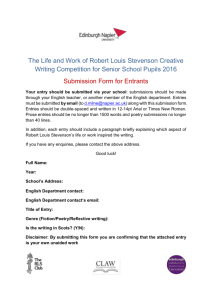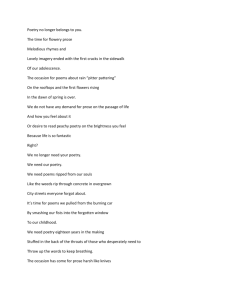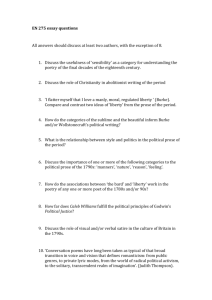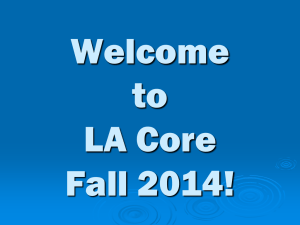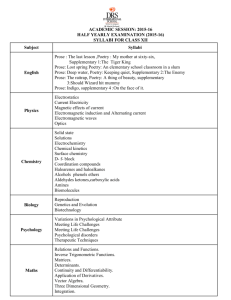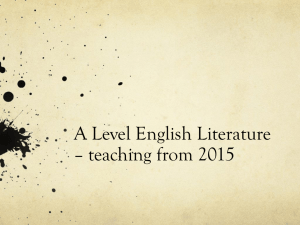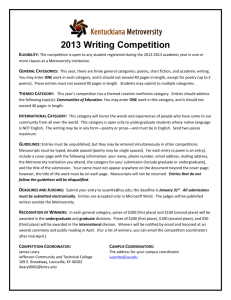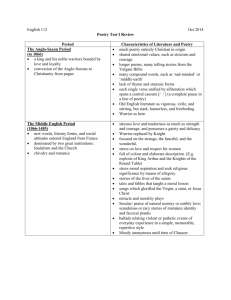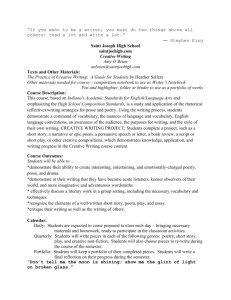Course Requirements
advertisement
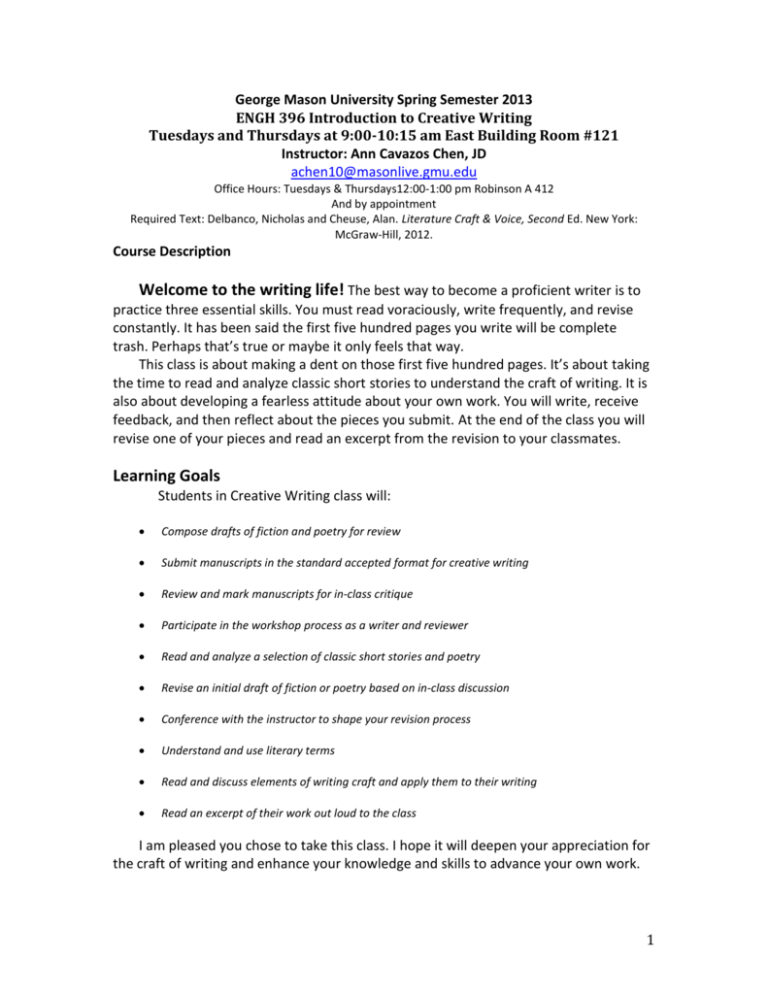
George Mason University Spring Semester 2013 ENGH 396 Introduction to Creative Writing Tuesdays and Thursdays at 9:00-10:15 am East Building Room #121 Instructor: Ann Cavazos Chen, JD achen10@masonlive.gmu.edu Office Hours: Tuesdays & Thursdays12:00-1:00 pm Robinson A 412 And by appointment Required Text: Delbanco, Nicholas and Cheuse, Alan. Literature Craft & Voice, Second Ed. New York: McGraw-Hill, 2012. Course Description Welcome to the writing life! The best way to become a proficient writer is to practice three essential skills. You must read voraciously, write frequently, and revise constantly. It has been said the first five hundred pages you write will be complete trash. Perhaps that’s true or maybe it only feels that way. This class is about making a dent on those first five hundred pages. It’s about taking the time to read and analyze classic short stories to understand the craft of writing. It is also about developing a fearless attitude about your own work. You will write, receive feedback, and then reflect about the pieces you submit. At the end of the class you will revise one of your pieces and read an excerpt from the revision to your classmates. Learning Goals Students in Creative Writing class will: Compose drafts of fiction and poetry for review Submit manuscripts in the standard accepted format for creative writing Review and mark manuscripts for in-class critique Participate in the workshop process as a writer and reviewer Read and analyze a selection of classic short stories and poetry Revise an initial draft of fiction or poetry based on in-class discussion Conference with the instructor to shape your revision process Understand and use literary terms Read and discuss elements of writing craft and apply them to their writing Read an excerpt of their work out loud to the class I am pleased you chose to take this class. I hope it will deepen your appreciation for the craft of writing and enhance your knowledge and skills to advance your own work. 1 Writing is a lifelong vocation of learning and working with words to tell stories that reflect the essential values of humanity. I wish you all the best of luck. Warmest regards, AC Chen Methods of Instruction This course will be highly interactive as we learn from the works of master storytellers as well as from each other. Most class sessions will use in-class writing exercises to warm up our creativity and practice a particular aspect of writing craft. There will be brief assigned readings concentrating on specific elements of creative writing. In addition we will periodically analyze a classic short story. Finally we will workshop class submissions and provide helpful feedback by critiquing what worked and what did not. Students who consistently participate, are prepared for class, complete their work in a timely fashion, and contribute to a supportive atmosphere for beginning writers will succeed in this class. Course Requirements Students will be required to submit three manuscripts consisting of either poetry or prose. Each manuscript will be electronically submitted to the instructor achen10@masonlive.gmu.edu with your name included on the file name. Each manuscript will consist of original creative work representing either prose or poetry Prose submissions will be not less than four pages double-spaced and not more than fifteen pages double-spaced (excerpts from longer works are acceptable) Poetry submissions will be submitted in groups of three In addition, each student will revise one submission and read an excerpt to the class Assignment Submission #1 Due February 7th Course Requirements Weight How It Will Be Graded 20% A: On time, in the proper format, acceptable page limits, very few grammatical and punctuation mistakes B: Late less than two days, minor format errors, several grammatical errors but does not effect the reading, meets the page length 2 requirements C: Late submission, improper format, does not meet the page length requirements frequent mistakes in grammar and punctuation Submission #2 Due March 21st 20% See Above Submission #3 Due April 18th 20% See Above Revision Due May 2nd Participation 20% Graded on an A-F scale 20% Graded on an A-F scale Includes being prepared for classroom discussion, and being actively engaged in classroom activities including in-class writing exercises. It also means being a productive member of the workshop process by making helpful suggestions and comments to your colleagues about their manuscripts. Proper Format Requirements o Electronically submitted on time to achen10@masonlive.gmu.edu o The file will include the student’s name o The manuscript will: o Be double-spaced o Will have page numbers o Will have a title (each poem will have its own title) o Will be in 12-pitch font o Will be between five and fifteen pages long if prose o Will consist of three poems if it is a poetry submission o The title will be centered 1/3 of the way down the first page o There will be a double-space between the title and the prose Note on Grading: This is a creative class. I will not attempt to sort out whether your stories or poems achieve creative merit. I expect you to take risks with your writing and try things 3 that scare you or make you uncomfortable. Your grade will be based on your ability to submit work in a proper format, actively participate, and revise. Your revision will receive a grade predominantly based on the progress you make incorporating comments and feedback into the draft. Class participation is key to success in this class. Completion Requirement Students must complete all four written assignments to pass this course. Course Grading Policy In grading essays, I use the following general criteria: A “C” level grade (70-79%) denotes average college-level writing and achievement. The essay is a competent response to the assignment: it meets, to some degree, all the assignment requirements, and demonstrates that the author has put significant time and effort into communicating his/her ideas to his/her targeted audience. Essays that do not meet these criteria will not earn a “C.” A “B” level grade (80-89%) highlights a strong example of college writing and thinking. In addition to meeting the “C” level requirements, such an essay goes further in some way(s): it demonstrates some insight, is tightly woven, reads smoothly at both the sentence and paragraph levels, and/or exhibits a personal “voice” or style. It has few sentence-level errors. An “A” level grade (90-100%) marks an essay that engages the reader in a provocative conversation. Even more than in a “B” essay, its author creates a fluid reading experience, provides unexpected insights, and/or uses language with care and facility. “D” and “F” level essays do not meet the basic expectations of the assignment 4 Important Dates First Day of Class: Tues Jan 22 Last Day to Add Classes: Tues Jan 29 Last Day to Drop With No Tuition Penalty: Tues Jan 29 Final Drop Deadline: Feb 22 Selective Withdrawal: Mon Feb 25- Fri Mar 29 Spring Break: Mon Mar 11 – Sun Mar 17 Last Day of Classes: Mon May 6 George Mason Policy on Plagiarism Plagiarism means using the exact words, opinions, or factual information from another source without giving that source credit. In a creative writing class that means the work must be the product of your imagination and effort. Students with Disabilities If you are a student with a disability and you need academic accommodations, please see me and contact the Office of Disability Services (ODS) at 703.993.2474. All academic accommodations must be arranged through the ODS. GMU Nondiscrimination Policy George Mason University is committed to providing equal opportunity and an educational and work environment free from any discrimination on the basis of race, color, religion, national origin, sex, disability, veteran status, sexual orientation, or age. GMU shall adhere to all applicable state and federal equal opportunity/affirmative action statutes and regulations. 5
